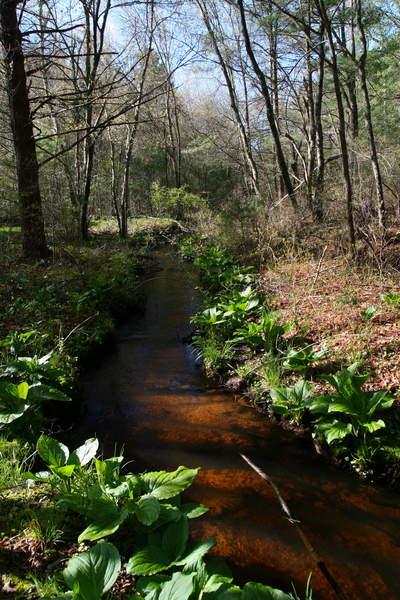Article 48. Patterson's Brook
The Community Preservation Commmittee is requesting $275,000 for the purchase of a conservation restriction for the Wareham Land Trust, Inc. (WLT) that will be placed on several parcels of land totaling 35 acres and surrounding Patterson's Brook.
The proposal has caused confusion for several reasons.
Primarily, it is unclear whether there is clear title to the land. The property is jointly owned by two siblings, Charles Robbins and Alice Akins. Robbins filed for bankruptcy last year. The bankruptcy court put the land up for sale, but Akins has been working with the court to buy her brother's share.
According to John Browning, WLT president, the land trust reached out to Akins to try and work out an agreement with her after they found out that she was interested in buying her brother's share of the property. They received no response. They have thus been negotiating with the bankruptcy court as well to purchase the property.
"We understand that she had the right of first refusal, but that [she and the court] could not reach an agreement," Browning said. "It appears she doesn't want the land in conservation. We would be more than happy to reach an agreement with her and have put in calls, but so far, nothing's happened.
Akins said she could not comment on the case for personal reasons, but that she was still interested in the property, which was a former trout farm run by her father.
Browning said that the uncertainty over ownership would have to be decided by the court, and they would await a court ruling before pursuing the project. To make the project attractive to the family, the land trust has exempted a one-acre parcel surrounding a home where Akins' daughter lives. Browning also notes that it was Robbins, the brother who filed for bankruptcy, who connected the Real Estate agents representing the property with the land trust.
"If the court says the family should have it, that's fine," Browning said. "If the court says an outsider can buy it, we think our proposal is best for the property as well as for the family."
The article is also confusing because it requests funds for a conservation restriction, not for ownership of the land. This does not mean that the land trust is not interested in purchasing the land, however. The land trust intends to buy the land but as a private nonprofit. It will sell the conservation restriction (essentially the development rights to the land) to the town. Since the town will hold the conservation restriction, not the property, the land trust is requesting funds for the former.
The funds requested also represent more than the property's sale price. The $275,000 will also fund restoration efforts for the brook, which will involve hiring a consultant and implementing his or her recommendations.
If the court doesn't make a determination by Town Meeting over whether the property can be sold outside the family, however, the land trust will recommend that the article be withdrawn.
"It's in the hands of the courts," said Browning. "If the court wants it sold to the public, though, we think we ought to be the ones to have it."













